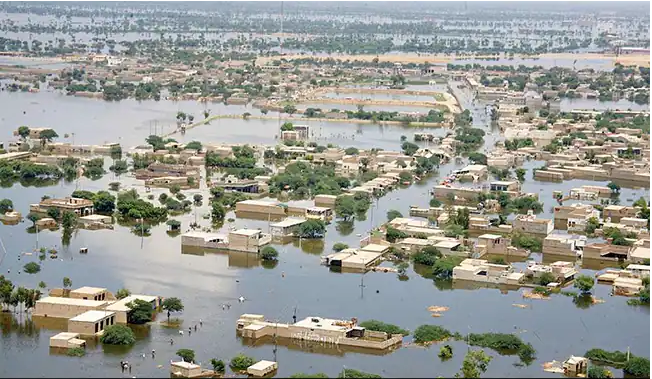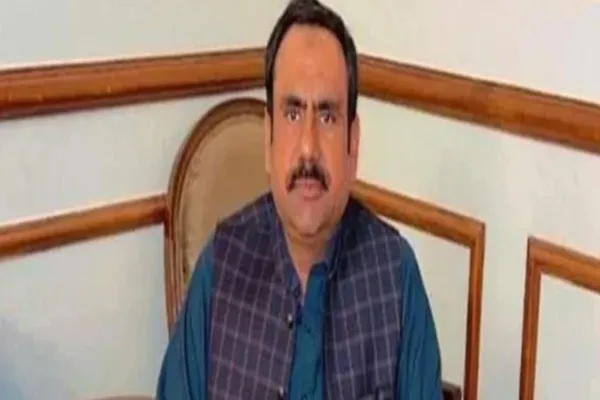i NEWS PAKISTAN
By Aftab Chaudhry
On World Earth Day, April 22, 2024, Pakistan, like many nations around the globe, finds itself confronting the harsh realities of climate change. However, amidst the pressing need for action, the government's response remains disappointingly lackluster, indicative of a systemic indifference to one of the most pressing issues of our time. Despite the global urgency surrounding climate change, Pakistan witnessed no significant events or campaigns for public awareness on Earth Day. Instead, the government's efforts were reduced to a mere token gesture – the planting of a couple of saplings at the federal level, accompanied by a flurry of news releases heralding this seemingly inconsequential act. Meanwhile, the country's focus appears skewed towards securing loans from international financial institutions, such as the IMF, with little attention given to developing comprehensive short and long-term strategies to combat climate change.
Contrary to popular belief, addressing climate change does not necessitate exorbitant budgets; rather, it requires a concerted effort to raise public awareness and implement measures that engage communities in climate action. The Paris Agreement, which was inked on 12th December 2015, hailed as a landmark accord in the fight against climate change, underscores the importance of international cooperation and collective action. Yet, Pakistan's commitment to the Agreement seems superficial, with little progress made towards meeting its obligations. The Agreement's goals of reducing greenhouse gas emissions and providing assistance to developing countries remain largely unmet, exacerbating Pakistan's vulnerability to the impacts of climate change. The Agreement includes commitments from all countries to reduce their emissions and work together to adapt to the impacts of climate change, and calls on countries to strengthen their commitments over time.
The Agreement provides a pathway for developed nations to assist developing nations in their climate mitigation and adaptation efforts while creating a framework for the transparent monitoring and reporting of countries’ climate goals. The Paris Agreement provides a durable framework guiding the global effort for decades to come. It marks the beginning of a shift towards a net-zero emissions world. Implementation of the Agreement is also essential for the achievement of the Sustainable Development Goals. The consequences of climate change are acutely felt across Pakistan, from erratic weather patterns to dwindling water reserves and devastating droughts. The economic toll of these environmental challenges is staggering, with losses amounting to billions of rupees annually. Moreover, deforestation continues unabated, driven by governmental mismanagement and corruption, further exacerbating Pakistan's ecological woes.
Air pollution emerges as a key contributor to global warming, yet concrete plans to mitigate its effects are conspicuously absent from the government's agenda. The ruling elite's short-sighted focus on political power and personal gain perpetuates a cycle of environmental neglect, shielded from the consequences of their actions by privilege and impunity. In the face of these challenges, ordinary Pakistanis bear the brunt of environmental degradation, their voices drowned out by the indifference of those in power. It is imperative for Pakistan to heed the warnings of climate scientists and take decisive action to mitigate the impacts of climate change. This requires a paradigm shift in governance, with a renewed focus on sustainability and inclusivity. According to the official data, Pakistan is losing about Rs 365 billion every year due to climate change. Deforestation continues in the country. According to an estimate, 70,000 hectares of forest are cut every year in the country, this is simply a result of the mismanagement and corruption of the government of Pakistan.
Pakistan has become the second country in the world in which forests are rapidly decreasing, trees have been cut down by hundreds of housing sites built in major cities of the country, including Islamabad, and this process is still going on, but no one is asking. Rather, the concerned authorities are also issuing NOCs with their own share. On the other hand, this land mafia is destroying the agricultural land of the country. This is a measure of food shortage for our future generations. The government claims that there are forests on five percent of the country, while according to the estimates of the United Nations Food and Agriculture Organization and the World Bank, forests remain on 2.1 percent of the area of Pakistan, while each country has 25 A percentage of the area should be forested. Air pollution is the main cause of global warming, but we do not see any specific plans to control air pollution, the truth is that the policy of the ruling class of Pakistan is based only on the system.
It is limited to the government and its duration is only till the completion of the term of the government because as soon as a government completes its term, its top officials go abroad where they live a life of luxury and most of the politicians. Have bought houses in the developed countries of the world where not only their businesses but also their family members are living there and climate change has no effect on them, so they can never harm the environment in the interest of the country. Friendly or people-friendly measures cannot be expected. As the world races against time to avert climate catastrophe, Pakistan stands at a critical juncture. The choice between inaction and action will define the country's environmental legacy for generations to come. Only through concerted efforts, both domestically and internationally, can Pakistan hope to mitigate the impacts of climate change and secure a sustainable future for all its citizens.

Credit: Independent News Pakistan









